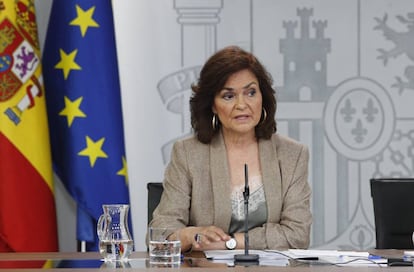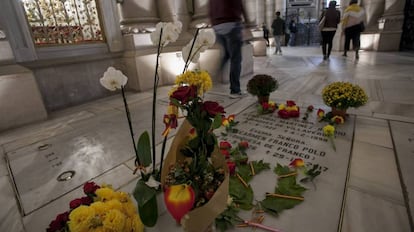Spanish government proposes closing all public spaces that glorify Franco
Authorities are racing to stop dictator’s family from reburying him at a popular cathedral in Madrid

The Spanish government is racing to enact a legal reform that will prevent the family of Francisco Franco from reburying the dictator’s remains inside the cathedral of La Almudena, a landmark site in the heart of Madrid.
The Pedro Sánchez administration is also considering the option of legally shutting down any public spaces that allow Franco supporters to congregate to honor his memory and his regime, which lasted from the end of the Civil War (1936-1939) until his death in 1975.
The Franco family would be forced to find a cemetery that is not open to the general public
Spain’s Socialist Party (PSOE) government and Franco’s family are locked in a protracted battle over the future of the dictator’s remains. When Sánchez became the new prime minister of Spain in early June through a successful no-confidence vote against Mariano Rajoy of the conservative Popular Party (PP), he pledged to take Franco’s remains out of the Valley of the Fallen, a controversial basilica and mausoleum located 50 kilometers outside Madrid.
But Franco’s family, which opposes the move, announced that if they are forced to exhume the body, they will take it to the family vault inside La Almudena cathedral, which already holds the remains of Franco’s daughter Carmen Polo. La Almudena is a landmark building that attracts thousands of visitors each year, and the government is now facing the prospect of watching it become a pilgrimage site for Franco supporters.
With victims’ associations threatening to stage street protests if this happens, and the Vatican refusing to mediate to prevent the transfer to La Almudena – despite an earlier meeting between Deputy PM Carmen Calvo and Vatican secretary of state Pietro Parolin, which the government had described as positive – the executive is now resorting to the law.

Although legislation already exists in the shape of the 2007 Historical Memory Law, which prohibits the public display of Francoist symbols, the government feels that this may not be enough to cover the current situation.
As a result, the PSOE has drafted an amendment to the law that specifically mentions Franco’s remains and states that these may not be interred in any place that is accessible to the public, according to party sources. If approved, this amendment would force the Franco family to find a cemetery that is not open to the general public.
A second draft amendment makes the owners of publicly accessible spaces responsible for any acts that glorify Franco, and subject to sanctions ranging from monetary fines to the temporary or even permanent closure of these places, said the same sources. This means that the government could even close churches if these were used for such purposes.
Other amendments
A third amendment addresses the awarding of medals to individuals "whose conduct was manifestly incompatible with the distinction," a clear reference to the case of "Billy the Kid," a former policeman known to have tortured people during the Franco regime. A fourth says that the state may initiate the search for victims who still lie in unmarked graves (until now, a private citizen had to file the request). A fifth amendment considers the creation of a Truth Commission that will be "an independent national agency" tasked with locating and analyzing historical documents and testimonies dating from July 1936 to December 1978, when Spain got its new Constitution.
It remains unclear when these amendments will be greenlighted by Congress, however. The PSOE government recently passed fast-track reforms to allow the exhumation of Franco’s remains from the Valley of the Fallen, thanks to sufficient support from opposition groups in a chamber where the PSOE leads a minority government.
But the PP and Ciudadanos, who abstained at that vote, are in control of the house agenda and they will request an extension to the amendment deadline, which will delay not just the passage of these reforms but also the actual exhumation of Franco’s remains.
The Sánchez government is already assuming that this will not happen before the end of the year, as it had originally planned. The executive did not foresee the complications arising from the Franco family’s strategic response to the exhumation plans, and is being forced to adapt to the changing situation as events develop.
English version by Susana Urra.
Tu suscripción se está usando en otro dispositivo
¿Quieres añadir otro usuario a tu suscripción?
Si continúas leyendo en este dispositivo, no se podrá leer en el otro.
FlechaTu suscripción se está usando en otro dispositivo y solo puedes acceder a EL PAÍS desde un dispositivo a la vez.
Si quieres compartir tu cuenta, cambia tu suscripción a la modalidad Premium, así podrás añadir otro usuario. Cada uno accederá con su propia cuenta de email, lo que os permitirá personalizar vuestra experiencia en EL PAÍS.
¿Tienes una suscripción de empresa? Accede aquí para contratar más cuentas.
En el caso de no saber quién está usando tu cuenta, te recomendamos cambiar tu contraseña aquí.
Si decides continuar compartiendo tu cuenta, este mensaje se mostrará en tu dispositivo y en el de la otra persona que está usando tu cuenta de forma indefinida, afectando a tu experiencia de lectura. Puedes consultar aquí los términos y condiciones de la suscripción digital.








































